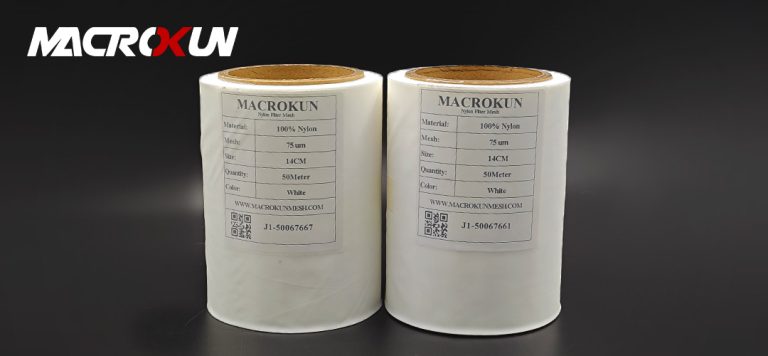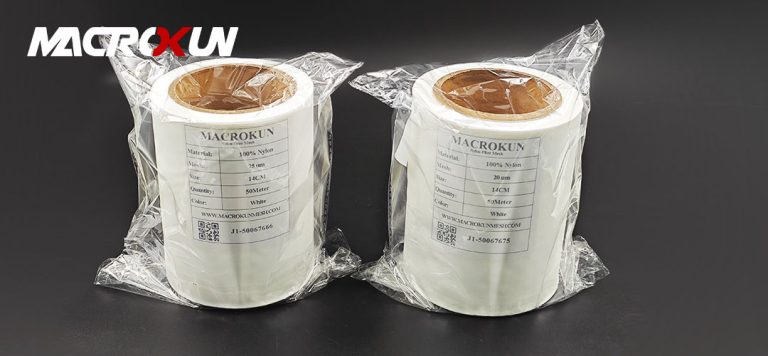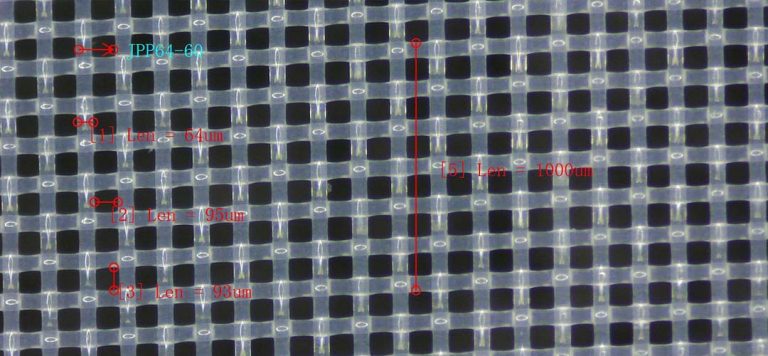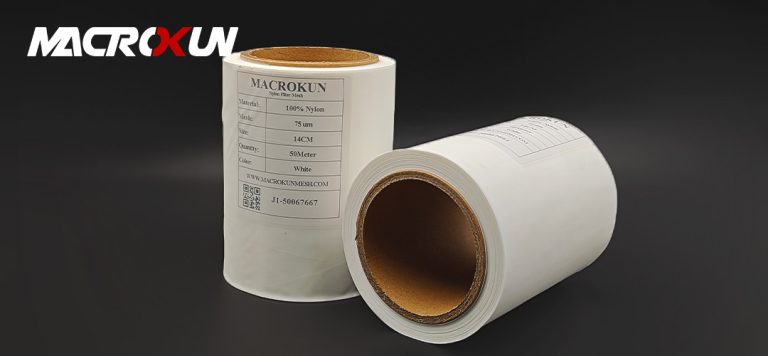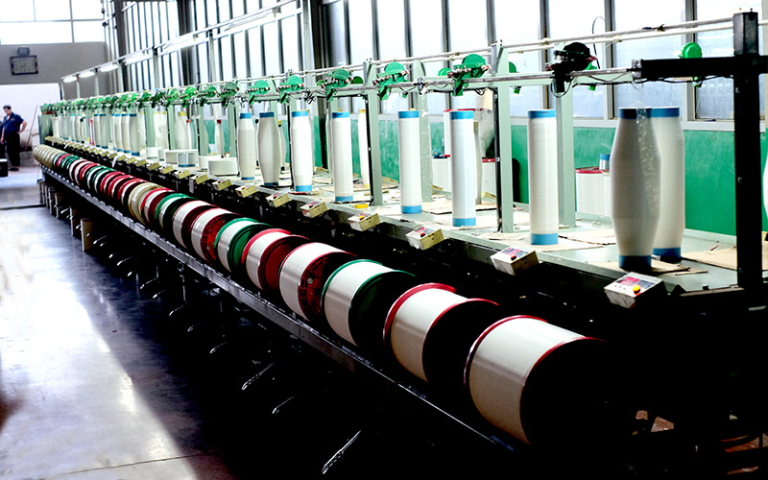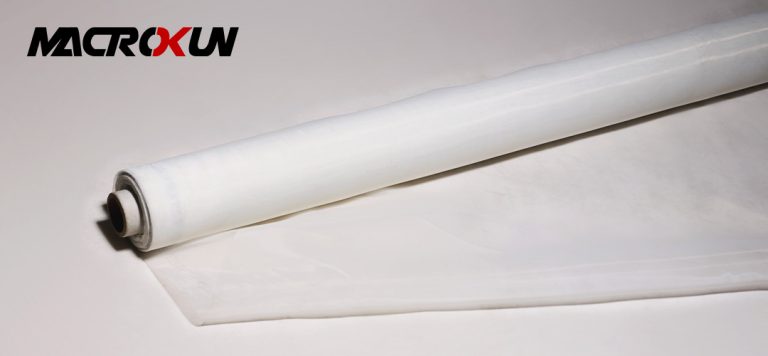Table of Contents
Benefits of Using nylon mesh for Industrial Filtration
Nylon mesh is a versatile material that is commonly used in industrial processes for filtration purposes. Its unique properties make it an ideal choice for a wide range of applications, from separating solids from liquids to removing impurities from gases. In this article, we will explore the benefits of using nylon mesh for industrial filtration and provide some tips on how to effectively use it in your processes.
One of the key advantages of nylon mesh is its durability. Nylon is a strong and resilient material that can withstand high temperatures and harsh chemicals, making it suitable for use in demanding industrial environments. This durability ensures that the mesh will not degrade or break down easily, allowing it to maintain its filtration efficiency over time.
| Model | Mesh Count (/cm) |
Mesh Count (/inch) |
Thread Dia (um) |
Mesh Opening (um) |
Thickness (um) |
Weight (g/m2) |
| NL4/1950 | 4 | 10 | 550 | 1950 | 1100 | 307 |
| NL5/1500 | 5 | 13 | 500 | 1500 | 1000 | 318 |
| NL6/1267 | 6 | 15 | 400 | 1267 | 800 | 244 |
| NL7/1079 | 7 | 18 | 350 | 1079 | 700 | 218 |
| NL8/900 | 8 | 20 | 350 | 900 | 700 | 249 |
| NL9/861 | 9 | 23 | 250 | 861 | 500 | 143 |
| NL9/811 | 9 | 23 | 300 | 811 | 600 | 206 |
| NL10/750 | 10 | 25 | 250 | 750 | 500 | 159 |
| NL10/700 | 10 | 25 | 300 | 700 | 600 | 229 |
| NL12/583 | 12 | 30 | 250 | 583 | 500 | 191 |
| NL12/533 | 12 | 30 | 300 | 533 | 600 | 274 |
| NL14/514 | 14 | 36 | 200 | 514 | 340 | 142 |
| NL16/425 | 16 | 40 | 200 | 425 | 340 | 160 |
| NL20/350 | 20 | 50 | 150 | 350 | 255 | 113 |
| NL20/300 | 20 | 50 | 200 | 300 | 340 | 200 |
| NL24/267 | 24 | 60 | 150 | 267 | 255 | 135 |
| NL28/237 | 28 | 70 | 120 | 237 | 204 | 101 |
| NL30/213 | 30 | 76 | 120 | 213 | 204 | 110 |
| NL32/213 | 32 | 80 | 100 | 213 | 170 | 80 |
| NL36/178 | 36 | 90 | 100 | 178 | 170 | 90 |
| NL40/150 | 40 | 100 | 100 | 150 | 170 | 100 |
| NL43/153 | 43 | 110 | 80 | 153 | 136 | 70 |
| NL48/128 | 48 | 120 | 80 | 128 | 136 | 77 |
| NL56/119 | 56 | 140 | 60 | 119 | 102 | 50 |
| NL64/96 | 64 | 160 | 60 | 96 | 102 | 58 |
| NL72/89 | 72 | 180 | 50 | 89 | 85 | 45 |
| NL80/75 | 80 | 200 | 50 | 75 | 85 | 50 |
| NL100/57 | 100 | 250 | 43 | 57 | 73 | 46 |
| NL110/48 | 110 | 280 | 43 | 48 | 73 | 52 |
| NL120/48 | 120 | 300 | 35 | 48 | 60 | 37 |
| NL120/40 | 120 | 300 | 43 | 40 | 73 | 55 |
| NL130/42 | 130 | 330 | 35 | 42 | 60 | 40 |
| NL130/34 | 130 | 330 | 43 | 34 | 73 | 61 |
| NL140/36 | 140 | 350 | 35 | 36 | 60 | 43 |
| NL157/25 | 157 | 400 | 43 | 25 | 73 | 74 |
| NL180/20 | 180 | 450 | 39 | 20 | 66 | 68 |
| NL200/15 | 200 | 500 | 39 | 15 | 66 | 76 |
| NL220/10 | 220 | 550 | 39 | 10 | 66 | 84 |
| NL240/5 | 240 | 600 | 39 | 5 | 66 | 91 |
Another benefit of nylon mesh is its flexibility. Nylon can be easily molded into different shapes and sizes, making it adaptable to a variety of filtration applications. Whether you need a fine mesh for capturing small particles or a coarser mesh for larger contaminants, nylon can be customized to meet your specific requirements.

In addition to its durability and flexibility, nylon mesh also offers excellent filtration performance. The fine pores of the mesh are capable of trapping particles of various sizes, ensuring that only clean fluids or gases pass through. This high filtration efficiency helps to improve the quality of the end product and reduce the risk of contamination in industrial processes.
Furthermore, nylon mesh is easy to clean and maintain. Unlike some other filtration materials, nylon can be washed or rinsed with water to remove trapped particles and restore its filtration capacity. This makes it a cost-effective option for industrial applications, as the mesh can be reused multiple times before needing to be replaced.
When using nylon mesh for industrial filtration, there are a few key tips to keep in mind. First, it is important to select the right mesh size for your application. The size of the mesh openings will determine the level of filtration achieved, so be sure to choose a mesh that is appropriate for the size of particles you need to capture.
Additionally, proper installation of the nylon mesh is crucial for optimal filtration performance. Make sure that the mesh is securely fastened in place and that there are no gaps or leaks that could allow unfiltered material to bypass the mesh. Regular inspection and maintenance of the mesh will also help to ensure its continued effectiveness.

In conclusion, nylon mesh is a highly effective and versatile material for industrial filtration. Its durability, flexibility, and high filtration performance make it an ideal choice for a wide range of applications. By following these tips and best practices for using nylon mesh, you can maximize its benefits and improve the efficiency of your industrial processes.
Step-by-Step Guide on How to Properly Install Nylon Mesh Filters
Nylon mesh filters are commonly used in industrial processes to separate solids from liquids or gases. They are durable, cost-effective, and easy to install. In this article, we will provide a step-by-step guide on how to properly install nylon mesh filters in your industrial equipment.
First, you will need to gather all the necessary materials for the installation. This includes the nylon mesh filter, a filter housing or frame, gaskets or seals, and any tools required for the installation process. Make sure that the nylon mesh filter is the correct size and shape for your equipment, as using the wrong filter can lead to inefficiencies or damage to your machinery.
Next, carefully inspect the nylon mesh filter for any defects or damage. It is important to ensure that the filter is clean and free of any debris before installation. If you notice any tears, holes, or other imperfections in the mesh, it is best to replace the filter with a new one to prevent any issues during operation.
Once you have confirmed that the nylon mesh filter is in good condition, you can begin the installation process. Start by placing the filter housing or frame in the designated location on your equipment. Make sure that the housing is securely attached and properly aligned to prevent any leaks or bypass of the filter.
Next, insert the nylon mesh filter into the housing or frame. Ensure that the filter is positioned correctly and that there are no gaps or wrinkles in the mesh. If necessary, use gaskets or seals to create a tight seal between the filter and the housing to prevent any leakage.
After the filter is securely in place, double-check all connections and seals to ensure that everything is properly installed. It is important to take your time during this step to avoid any potential issues with the filter later on. Once you are satisfied with the installation, you can proceed to test the filter to ensure that it is functioning correctly.
To test the nylon mesh filter, run a small amount of liquid or gas through the equipment and observe the filtration process. Check for any leaks, bypass, or other issues that may indicate a problem with the filter installation. If everything appears to be working properly, you can proceed with using the filter in your industrial processes.
In conclusion, installing nylon mesh filters in industrial equipment is a straightforward process that can help improve the efficiency and effectiveness of your operations. By following the steps outlined in this guide, you can ensure that your filters are properly installed and functioning correctly. Remember to regularly inspect and maintain your filters to prolong their lifespan and prevent any issues with your equipment.
Common Mistakes to Avoid When Using nylon mesh for filtering
Nylon mesh is a versatile material that is commonly used in industrial processes for filtering purposes. It is known for its durability, flexibility, and resistance to chemicals, making it an ideal choice for a wide range of applications. However, there are some common mistakes that can be made when using nylon mesh for filtering that can compromise its effectiveness. In this article, we will discuss these mistakes and provide tips on how to avoid them.
One common mistake when using nylon mesh for filtering is using the wrong mesh size. The mesh size refers to the number of openings per inch in the mesh material. Choosing the right mesh size is crucial for achieving the desired level of filtration. If the mesh size is too small, it can clog easily and reduce the flow rate. On the other hand, if the mesh size is too large, it may not be able to capture smaller particles effectively. It is important to carefully consider the size of the particles that need to be filtered and select a mesh size that is appropriate for the application.
Another common mistake is not properly cleaning and maintaining the nylon mesh. Over time, the mesh can become clogged with debris, reducing its effectiveness. It is important to regularly clean the mesh to remove any buildup of particles and ensure that it continues to filter efficiently. Depending on the application, the mesh may need to be cleaned using a variety of methods, such as rinsing with water, soaking in a cleaning solution, or using a brush to remove debris. Regular maintenance of the nylon mesh will help to prolong its lifespan and ensure optimal performance.
Improper installation of the nylon mesh can also lead to issues with filtering. It is important to ensure that the mesh is securely attached to the filtering equipment and that there are no gaps or leaks that could allow unfiltered material to pass through. Additionally, the mesh should be installed in the correct orientation to ensure that it is able to capture particles effectively. Care should be taken to avoid stretching or tearing the mesh during installation, as this can compromise its integrity and reduce its filtering capabilities.
Using nylon mesh for filtering in applications where it is not suitable is another common mistake. Nylon mesh is best suited for filtering applications where the temperature, pressure, and chemical compatibility requirements are within its limits. Using nylon mesh in high-temperature or high-pressure environments can cause the material to degrade quickly and compromise its effectiveness. It is important to carefully consider the specific requirements of the application and select a filtering material that is appropriate for the conditions.
In conclusion, there are several common mistakes that can be made when using nylon mesh for filtering in industrial processes. By choosing the right mesh size, properly cleaning and maintaining the mesh, ensuring proper installation, and selecting the appropriate material for the application, these mistakes can be avoided. Nylon mesh is a valuable tool for filtering in industrial processes, and by following these tips, it can be used effectively to achieve optimal results.
Tips for Maintaining and Cleaning Nylon Mesh Filters
Nylon mesh filters are commonly used in industrial processes for their durability and effectiveness in filtering out impurities. However, like any other filter, they require regular maintenance and cleaning to ensure optimal performance. In this article, we will discuss some tips for maintaining and cleaning nylon mesh filters to prolong their lifespan and efficiency.
One of the most important aspects of maintaining nylon mesh filters is regular inspection. It is essential to inspect the filters periodically to check for any signs of wear and tear, such as holes or tears in the mesh. If any damage is found, it is crucial to replace the filter immediately to prevent any impurities from passing through.
In addition to visual inspection, it is also important to monitor the pressure drop across the filter. A significant increase in pressure drop can indicate that the filter is becoming clogged and needs to be cleaned or replaced. Monitoring the pressure drop regularly can help prevent any potential issues with the filtration process.
When it comes to cleaning nylon mesh filters, there are several methods that can be used depending on the type of impurities being filtered out. One common method is to use a mild detergent and warm water to clean the filter. Simply soak the filter in the detergent solution for a few minutes, then rinse it thoroughly with clean water to remove any residue.
For more stubborn impurities, such as oil or grease, a degreaser can be used to clean the filter. It is important to follow the manufacturer’s instructions when using a degreaser to ensure that the filter is not damaged during the cleaning process. After using a degreaser, the filter should be rinsed thoroughly with clean water to remove any remaining residue.
Another method for cleaning nylon mesh filters is to use compressed air to blow out any trapped particles. This method is particularly effective for removing fine particles that may be difficult to remove with other cleaning methods. However, it is important to use caution when using compressed air to avoid damaging the filter.
In addition to regular cleaning, it is also important to properly store nylon mesh filters when they are not in use. Filters should be stored in a clean, dry environment to prevent any contamination or damage. It is also important to store filters in a way that prevents them from becoming crushed or deformed, as this can affect their effectiveness.
Overall, maintaining and cleaning nylon mesh filters is essential for ensuring optimal performance in industrial processes. By following these tips and regularly inspecting, cleaning, and storing filters, you can prolong their lifespan and maintain their efficiency. Remember to always follow the manufacturer’s instructions when cleaning filters to prevent any damage and ensure that they continue to effectively filter out impurities.
Innovative Applications of Nylon Mesh in Industrial Processes
Nylon mesh is a versatile material that has found a wide range of applications in various industries. One of the most common uses of nylon mesh is for filtering in industrial processes. Nylon mesh filters are known for their durability, flexibility, and efficiency in separating particles of different sizes. In this article, we will explore how nylon mesh can be effectively used for filtering in industrial processes.
Nylon mesh filters are commonly used in industries such as food and beverage, pharmaceuticals, chemicals, and water treatment. These filters are designed to remove impurities, contaminants, and particles from liquids and gases, ensuring that the final product meets the required quality standards. Nylon mesh filters are available in different mesh sizes, ranging from coarse to fine, depending on the specific requirements of the industrial process.
One of the key advantages of using nylon mesh filters is their high tensile strength and resistance to abrasion. This makes them ideal for filtering applications where the filter is subjected to high pressure or abrasive materials. Nylon mesh filters can withstand harsh operating conditions without losing their filtering efficiency, making them a cost-effective solution for industrial processes.
In addition to their durability, nylon mesh filters are also known for their flexibility and ease of use. Nylon mesh can be easily cut, shaped, and molded to fit different filter housings and configurations. This flexibility allows for customization of the filter to meet the specific requirements of the industrial process. Nylon mesh filters can also be easily cleaned and reused, reducing the overall operating costs for the industrial process.
When using nylon mesh filters for filtering in industrial processes, it is important to consider the mesh size and filtration efficiency. The mesh size of the filter determines the size of particles that can be effectively removed from the liquid or gas. A finer mesh size will capture smaller particles but may also reduce the flow rate of the process. It is important to select the appropriate mesh size based on the particle size distribution in the process stream.
Another important factor to consider when using nylon mesh filters is the filtration efficiency. The filtration efficiency of the filter determines the percentage of particles that are removed from the process stream. Higher filtration efficiency filters will remove more particles but may also require more frequent cleaning or replacement. It is important to balance filtration efficiency with operating costs to ensure optimal performance of the filter.
In conclusion, nylon mesh filters are a versatile and cost-effective solution for filtering in industrial processes. Their durability, flexibility, and efficiency make them ideal for a wide range of applications in industries such as food and beverage, pharmaceuticals, chemicals, and water treatment. By selecting the appropriate mesh size and filtration efficiency, nylon mesh filters can effectively remove impurities and contaminants from liquids and gases, ensuring the quality and purity of the final product. Whether it is for removing particles from a liquid stream or capturing contaminants in a gas stream, nylon mesh filters are a reliable and efficient choice for industrial filtration applications.


